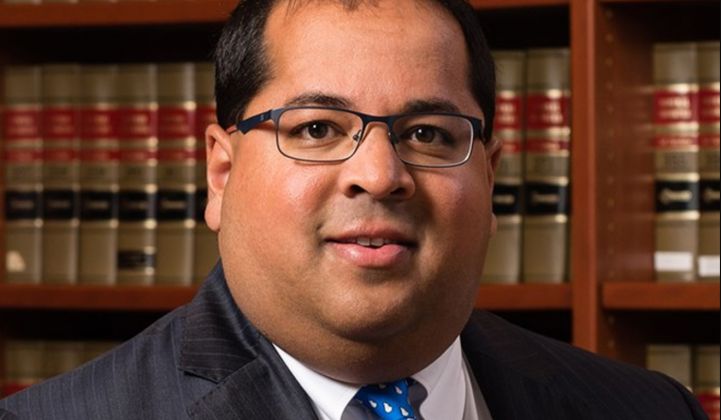One of Neil Chatterjee's top priorities in his new role as interim chairman of the Federal Energy Regulatory Commission is to ensure coal and nuclear power receive some form of compensation for the "resilience and reliability" benefits they provide to the U.S. electric system.
Resilience and reliability "are essential to national security," said Chatterjee, in an interview on FERC's Open Access podcast.
"To that end, I believe baseload power should be recognized as an essential part of the fuel mix," he continued. "I believe that generation, including our existing coal and nuclear fleet, need to be properly compensated to recognize the value they provide to the system."
Chatterjee did not expand on what he considers proper compensation to be, but his comments suggest that he supports granting baseload energy resources enhanced payments in the nation's wholesale power markets. New compensation structures are front of mind for coal and nuclear generators, which have been struggling to compete with low-cost natural gas and cost-effective renewable energy in an environment of stagnant load growth.
Earlier this year, Exelon CEO Chris Crane said there’s never been a more uncertain time in his career than right now, due to the risks facing the nation’s nuclear power fleet. "There are significant challenges with current market design,” said Crane, speaking at the National Association of Regulatory Utility Commissioners’ winter meeting.
“States and locations we serve want affordable and reliable, but also clean, power,” he said. “How you create a market signal around that to adequately compensate all generators within the stack is very important.”
He said he hoped for a solution "with some clarity coming from this administration and some clarity coming from FERC."
Indeed, the commission has started to grapple with the compensation issue, despite the fact that it hasn't been fully staffed for six months. In May, Commissioner Cheryl LaFleur spearheaded a technical conference on the interaction between wholesale markets and state-level energy policies, while waiting for FERC to regain a quorum. But the most difficult work still lies ahead.
FERC will need to address the market impacts of nuclear credit programs passed in New York and Illinois that opponents say are artificially suppressing power prices and putting financial pressure on independent power producers. PJM and ISO New England have put forward proposals to bifurcate capacity and pricing to protect unsubsidized coal and gas plants from subsidized nuclear and renewable energy prices, which would benefit independent generators like Dynegy, NRG and Calpine.
At the same time, PJM Interconnection and Midcontinent Independent System Operator are considering enhanced payments for reliable baseload resources, like nuclear. Furthermore, PJM, ISO-New England and New York ISO are considering carbon-adder proposals that increase market prices based on a generator's emissions intensity.
The set of issues and tasks FERC is now facing is complex, to say the least.
Former FERC Commissioner Tony Clark recently wrote a white paper in which he argued that a mix of state-led and market-based actions has the potential to create chaos. "From Illinois and New York, where nuclear generators stand to receive millions of dollars in state-sponsored subsidies, to states in New England and the mid-Atlantic, where massive out-of-market contracts and payments threaten the underpinnings of price formation in both the energy and capacity markets, there is a very real concern and possibility that certain wholesale electricity markets will become so dysfunctional as to undermine the just and reasonable standard that FERC is duty-bound to uphold,” he wrote.
These complex dynamics are now playing out in Ohio, where American Electric Power said it's seeking partial re-regulation, while FirstEnergy is looking to obtain the same kind of nuclear energy credits approved in New York and Illinois. Yesterday, Ohio regulators upheld a separate plan that permits FirstEnergy to collect $600 million from ratepayers over three years for grid modernization, although critics argue it's actually a backdoor way to bail out the utility's uncompetitive coal-fired and nuclear power plants. The Environmental Defense Fund and other opponents have already said they will challenge the decision at the Ohio Supreme Court.
Today's energy market shakeups don't even end there. Baseload generators are also looking to the Department of Energy for support through a study on how tax policies and subsidies may be triggering the premature retirement of coal and nuclear power plants around the country. The report was due in early July, but has yet to be released.
Like Chatterjee, Energy Secretary Rick Perry views the preservation of baseload resources as a national security concern and a federal government priority. "Are there issues that are so important to the national security of this country that the federal government can intervene on the regulatory side? I’ll suggest there are," Perry said at a conference this spring. "Being able to have and make sure we’re able to maintain a baseload on our grid is [a matter] of national security."
Others view the DOE report as an unfounded attack on intermittent renewables and advanced energy technologies, which a growing body of research has found are not a threat to grid reliability.
As a Kentucky native, Chatterjee said he's seen firsthand how important coal's contribution is to an affordable and reliable electric system.
"Last year, coal provided over 80 percent -- 80 percent -- of the electricity in Kentucky," he said. "As a nation, we need to ensure that coal, along with gas and renewables, continues to be part of our diverse fuel mix."
Besides defending coal, Chatterjee said he's keen to work through a backlog of infrastructure projects now before the commission that could "help spur economic development." He said he's also fascinated by technology innovation in the energy sector and looks forward to "exploring what opportunities exist for these new technologies," possibly referring to FERC's proposed rules on the integration of energy storage and distributed energy resources into organized markets.
The Senate approved Chatterjee's nomination on August 4. He will serve as interim FERC chairman while Trump nominee Kevin McIntyre awaits confirmation.



